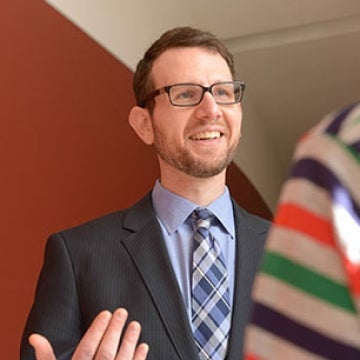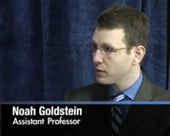
Noah Goldstein
- Conformity
- Health
- Management
- Marketing
- Persuasion
- Social Judgment
- Social Norms
Biography
UCLA Anderson Professor of Management and Organizations Noah Goldstein holds joint appointments at UCLA in the Psychology Department and at the David Geffen School of Medicine. His primary line of research involves the study of the factors that lead people to change their behaviors in a variety of contexts, including management, marketing and health. He has been awarded research fellowships and grants from the National Science Foundation and the National Institutes of Health, among others.
Goldstein teaches the psychology of persuasion and advises corporate and government organizations, where his insights from tested persuasion research have had substantial impact. He has also served on the Scientific Advisory Boards of two Fortune Global 500 companies.
Goldstein has coauthored two widely acclaimed books on persuasion. Yes!: 50 Scientifically Proven Ways to Be Persuasive, published in 2008, was a New York Times best-seller that has been translated in over 25 languages. He and his colleagues most recently published The Small BIG, which presents new science showing how small, often ignored changes to one’s influence strategies can pay disproportionately big dividends — all without compromising one’s ethics.
Before he was a professional behavioral researcher, says Goldstein, “I was an amateur persuasion scientist.”
At age 16, Goldstein unwittingly conducted his first controlled persuasion experiment. Working a summer job in telemarketing, he noticed the company’s standard script wasn’t exactly persuasive. So he made strategic adjustments to it and tested them on every other call he made. He very quickly found that the new pitch was far superior, leading him to handily surpass his far more experienced colleagues in sales. “That experience showed me the power of using the scientific method to go beyond anecdotes, hunches and personal experience to discover what really makes something persuasive.”
More than 20 years since his initial foray into the science of persuasion, Goldstein is still focused on what research can tell us about how to be more persuasive. He teaches his MBAs to understand what researchers have learned about the factors that make persuasion strategies maximally influential. Although his courses require a deep understanding of persuasion research and theory, his primary focus is on applying the principles of persuasion to make the students more effective influencers in their professional and personal lives. “If my students learned the theory without knowing how to apply these principles in a variety of contexts, I would feel like my job isn’t done.”
Education
Ph.D. Social Psychology, 2007, Arizona State University
M.A. Social Psychology, 2004, Arizona State University
B.S. Human Development, 2000, Cornell University
Recognition
2018 Outstanding Teaching Award, GEMBA NUS-UCLA Program, UCLA Anderson
2017 Outstanding Teaching Award, GEMBA NUS-UCLA Program, UCLA Anderson
Neidorf “Decade” Teaching Award, UCLA Anderson
Citibank Teaching Award for Most Outstanding MBA Teacher, UCLA Anderson, 2014
Emerald Management Reviews Citation of Excellence Award (awarded for impact to the top 50 out of 15,000 peer-reviewed management research papers published in 2008), 2012
JCR Best Article Award (for the best Journal of Consumer Research article published in 2008), 2011
Dean George W. Robbins Assistant Professor Teaching Award, UCLA Anderson, 2011
Eric and E Juline Faculty Excellence in Research Award, UCLA Anderson, 2010
New York Times Best Seller List (Yes!), 2008
Selected Publications
Rogers, T., Goldstein, N. J., & Fox, C. R. (2018). Social mobilization. Annual Review of Psychology, 69, 357-81.
Schultz, P. W., Nolan, J. M., Cialdini, R. B., Goldstein, N. J., & Griskevicius, V. (2018). The constructive, destructive, and reconstructive power of social norms-reprise. Perspectives on Psychological Science, 13 (2), 249-254.
Linder, J. A., Meeker, D., Fox, C. R., Friedberg, M. W., Persell, S. D., Goldstein, N. J., & Doctor, J. N. (2017). Persistence of effects of behavioral interventions on inappropriate antibiotic prescribing. Journal of the American Medical Association (JAMA), 318 (14), 1391-1392.
Cortland, C. I.,* Craig, M.,* Shapiro, J. R., Richeson, J., Neel, R., & Goldstein, N. J. (2017). Solidarity through shared disadvantage: Highlighting shared experiences of discrimination improves relations between stigmatized groups. Journal of Personality and Social Psychology, 113 (4), 547-567.
Meeker, D., Linder, J. A., Fox, C. R., Friedberg, M. W., Persell, S. D., Goldstein, N. J., Knight, T. K., Hay, J. W., & Doctor, J. N. (2016). Effect of behavioral interventions on inappropriate antibiotic prescribing among primary care practices: A randomized clinical trial. Journal of the American Medical Association (JAMA), 315, 562-570.
Hays, N. A.*, & Goldstein, N. J. (2015) Power and legitimacy influence conformity. Journal of Experimental Social Psychology, 60, 17-26.
Goldstein, N. J., Vezich, I. S.,* & Shapiro, J. R. (2014). Perceived perspective-taking: When others walk in our shoes. Journal of Personality and Social Psychology, 106, 941-960.
Meeker, D., Knight, T. K., Friedberg, M. W., Linder, J. A., Goldstein, N. J., Fox, C. R., Rothfeld, A., Diaz, G., & Doctor, J. N. (2014). Nudging guideline-concordant antibiotic prescribing using public commitments. JAMA Internal Medicine, 174, 425-431.
Goldstein, N. J., & Hays, N. A. (2011). Illusory power transference: The vicarious experience of power. Administrative Science Quarterly, 56, 593-621.
Goldstein, N. J., Griskevicius, V., & Cialdini, R. B. (2011). Reciprocity by proxy: A novel influence strategy for stimulating cooperation. Administrative Science Quarterly, 56, 441-473.
Griskevicius, V., Goldstein, N. J., Mortensen, C. R., Sundie, J. M., Cialdini, R. B., & Kenrick, D. T. (2009). Fear and loving in Las Vegas: Evolution, emotion, and persuasion. Journal of Marketing Research, 46, 384-395.
Ackerman, J. M., Goldstein, N. J., Shapiro, J. R., & Bargh, J. A. (2009). You wear me out: The vicarious depletion of self-control. Psychological Science, 20, 326-332.
Goldstein, N. J. (2009). Harnessing social pressure. Harvard Business Review, 87, 25.
Goldstein, N. J., Cialdini, R. B., & Griskevicius, V. (2008). A room with a viewpoint: Using social norms to motivate environmental conservation in hotels. Journal of Consumer Research, 35,472-482.a
Nolan, J. P., Schultz, P. W., Cialdini, R. B., Goldstein, N. J., & Griskevicius, V. (2008). Normative social influence is underdetected. Personality and Social Psychology Bulletin, 34, 913-923.
Griskevicius, V., Cialdini, R. B., & Goldstein, N. J. (2008). Peer influence: An underestimated and underemployed lever for change. Sloan Management Review, 49, 84-88.
Goldstein, N. J., & Cialdini, R. B. (2007). The spyglass self: A model of vicarious self-perception. Journal of Personality and Social Psychology, 92, 402-417.
Schultz, P. W., Nolan, J. M., Cialdini, R. B., Goldstein, N. J., & Griskevicius, V. (2007). The constructive, destructive, and reconstructive power of social norms. Psychological Science, 18, 429-434.
Griskevicius, V., Goldstein, N. J., Mortensen, C. R., Cialdini, R. B., & Kenrick, D. T. (2006). Going along versus going alone: When fundamental motives facilitate strategic (non)conformity. Journal of Personality and Social Psychology, 91, 281-294.
Cialdini, R. B., & Goldstein, N. J. (2004). Social influence: Compliance and conformity. Annual Review of Psychology, 55, 591-621.
Cialdini, R. B., Petrova, P. K., & Goldstein, N. J. (2004). The hidden costs of organizational dishonesty. Sloan Management Review, 45, 67-73.
